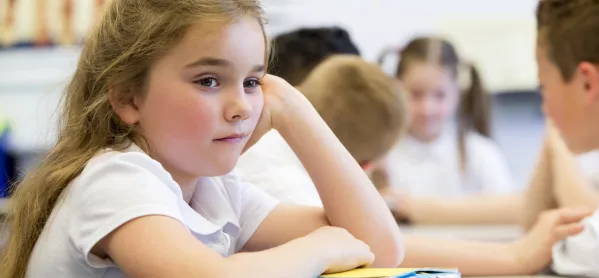A quarter of primary pupils have hidden social, emotional and mental-health difficulties, a new study has found.
They can include low self-esteem and a lack of emotional security in school, as well as a mistrust of adults.
Quick read: ‘Schools’ mental health support should be inspected by Ofsted’
Opinion: One primary head: ‘I can’t think of a single successful Camhs referral in years’
Listen: The Tes Podcast: Sats and mental health
Florence Ruby, head of research for the charity Nurture UK, conducted the study. She said: “In one classroom, there are perhaps three or four pupils who are quite challenging. Teachers notice them.
“But certain things, for example lower self-esteem or difficulties interacting with other pupils, are not so easily noticed. Pupils with these difficulties who are quiet and spend their time learning are not so easily noticed.”
The study, conducted over four terms in 25 primary schools in England, involved teachers assessing the social, emotional and mental-health needs of more than 6,800 pupils.
Teachers used the Boxall Profile, an assessment tool designed by educational psychologists to identify children’s social, emotional and behavioural needs.
This profile is usually used to help diagnose high-needs pupils. But Dr Ruby asked teachers to use the profile on all pupils in their class. This revealed that a total of one in three pupils had “moderate or severe” social, emotional or mental-health (SEMH) needs.
This included 26 per cent of children who were found to have largely hidden moderate SEMH needs.
The most common difficulty experienced by these pupils was low self-esteem or a lack of emotional security in school. This tended to manifest itself as a mistrust of adults or a difficulty asking for help when needed.
Dr Ruby said that schools had previously assumed that roughly one in 10 of their pupils had SEMH needs.
“Schools were quite surprised by the results,” she said. “I don’t think it’s enough to say, ‘We’re in quite a good area. Our Sats results are quite good.’
“No school and no teacher knows the SEMH needs of their children without assessing them. It’s not an easy thing to spot, these subtle social and emotional difficulties.”
She added that it was necessary for pupils to be given the right support for their needs. “There’s a lot of pressure around children at the moment - results, the pressure to do well at school, and not necessarily the right kind of support at home,” she said.
“Schools are really well-placed to provide that support,” Dr Ruby said.
“I know that teachers and teaching assistants are really stretched, in terms of capacity and responsibility. But being able to know: OK, these are the needs of the children in my class - teachers will find it helpful.”
Jill Weatherston, nurture lead at Marsh Green Primary, in Wigan, who was among the teachers taking part in the study, agreed. “It highlighted children who we would never have done any work with otherwise because they present as happy, calm and quiet,” she said of the research.
“However, when we started assessing them, they were flagged as having issues like an underdeveloped sense of self.
“If pupils don’t feel happy and safe within school, they won’t learn anyway. So you can all carry on teaching to your heart’s content, but they won’t take it in if they don’t feel happy and secure, and their basic needs aren’t being met.”
Kevin Kibble, chief executive of Nurture UK, said: “We must help teachers identify and support children with SEMH needs, before issues escalate, harming their education and potentially leading to exclusion.”




